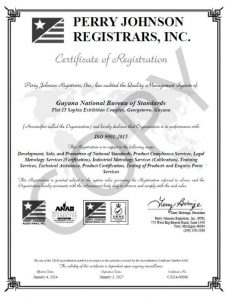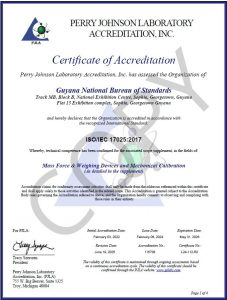World Environment Day (WED) will be observed on June 5. The theme for this year is “Ending Plastic Pollution Globally,” calling for collective action to address this global issue. The Guyana National Bureau of Standards (GNBS) strongly supports the need to address environmental pollution caused by non-biodegradable and harmful materials, such as plastics and hazardous chemicals.
On the occasion of World Environment Day, GNBS calls on businesses to play a leading role in ending pollution by utilising standards and implementing sustainable waste management practices. GNBS encourages companies to implement an Environmental Management System (EMS) in accordance with the International Standard ISO 14001:2015, Environmental Management Systems – Requirements with Guidance for Use.
Implementing an environmental management system can help businesses reduce energy consumption, resulting in reduced bills and waste, and ultimately contributing to environmental protection.
Implemented by over 500,000 companies globally, the standard enables businesses and organisations of any size or type to control the environmental impact of their activities, products, or services. It provides organisations with a framework to protect the environment and to respond to changing environmental conditions in balance with socio-economic needs.
The standard does not state specific environmental performance criteria, but it allows businesses or companies to establish environmental objectives at relevant levels, considering their risks and opportunities. The document notes that companies must consider the resources needed to develop, implement, and maintain their EMS, the competence of employees to manage the system, and effective communication to ensure overall success.
The success of an EMS depends on commitment from all levels and functions of the organisation, led by top management. Through the standard, management is provided with the tools to control their environmental aspects and improve their environmental performance, demonstrating to their business partners, regulatory agencies, and community that they are environmentally responsible. Further, it enhances profits through potential process improvements and energy conservation.
GNBS, through its Business Development Department, can assist any company looking to implement this standard. The process begins with a review of the business’s operations to identify all activities that have a negative environmental impact. This will be followed by developing strategies to mitigate the ecological effects of these activities.
The Bureau’s professional staff can assist with the development of an environmental policy and help identify the requirements to operationalise that policy, including procedures and programmes designed to mitigate the impact of the company’s operations on the environment. Through its reliable internal auditing services, the Bureau can also evaluate the implementation and performance of the Environmental Management System (EMS).
In addition to the ISO 14001 Standard, there are other environmental standards available to businesses, including the GYS 9 – 10: 2014 for the Labelling of equipment, items and parts containing refrigerants, GYS 263: 2010 Guidelines for noise emission into the environment, and GYS 207: 2002 Interim guidelines for industrial effluent discharge into the environment. There is also the GYS 229: 2004 Methods of sampling and testing for water and wastewater: Part 16 – Oil and grease, Copper, Iron, Zinc, etc., which specific companies can implement.
As we celebrate World Environment Day 2025, the GNBS urges businesses and organisations to implement National and International Standards in their operations, which can help to protect the environment for future generations. To learn more about the available standards, please visit the GNBS website at www.gnbsgy.com, or contact us via WhatsApp at 692-4627 (GNBS) or call 219-0064-66.






